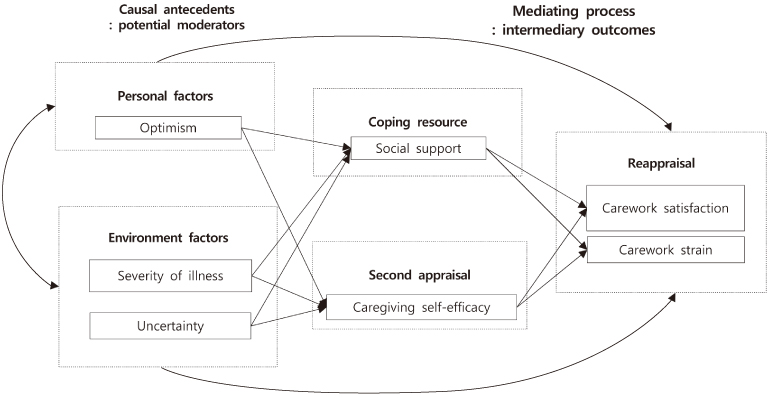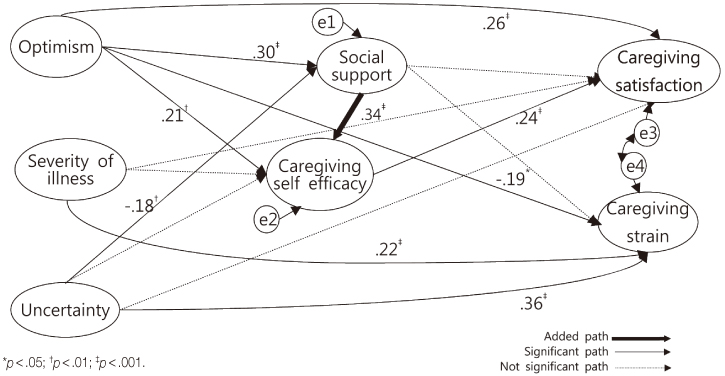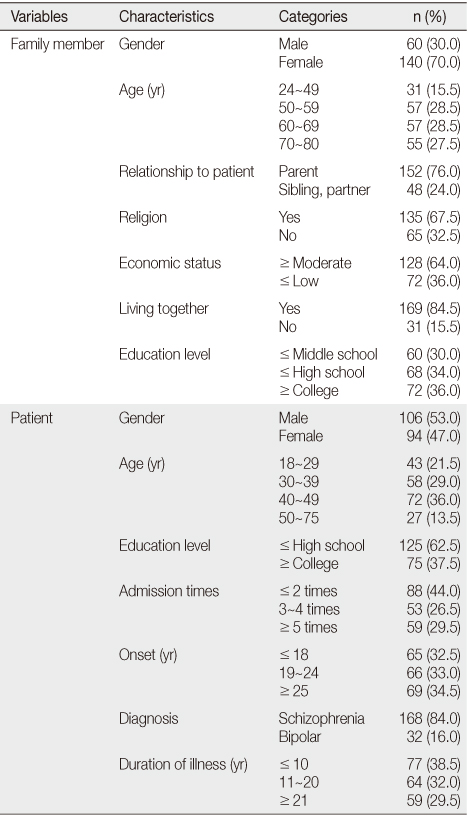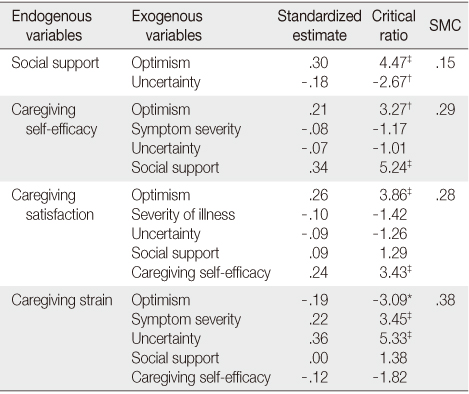Articles
- Page Path
- HOME > J Korean Acad Nurs > Volume 45(1); 2015 > Article
-
Original Article
- Structural Equation Model for Caregiving Experience of Families Providing Care for Family Members with Mental Disorders
- In Ohg Oh, Sunah Kim
-
Journal of Korean Academy of Nursing 2015;45(1):97-106.
DOI: https://doi.org/10.4040/jkan.2015.45.1.97
Published online: February 27, 2015
1National Health Insurance Service Ilsan Hospital, Goyang, Korea.
2College of Nursing, Yonsei University · Nursing Policy Research Institute, College of Nursing, Yonsei University, Seoul, Korea.
- Address reprint requests to: Kim, Sunah. College of Nursing, Yonsei University, 50-1 Yonsei-ro, Seodaemun-gu, Seoul 120-752, Korea. Tel: +82-2-2228-3275, Fax: +82-2-392-5440, PSY0962@yuhs.ac
© 2015 Korean Society of Nursing Science
This is an Open Access article distributed under the terms of the Creative Commons Attribution NoDerivs License. (http://creativecommons.org/licenses/by-nd/4.0/) If the original work is properly cited and retained without any modification or reproduction, it can be used and re-distributed in any format and medium.
Abstract
-
Purpose
- This study was done to develop and test a structural model for caregiving experience including caregiving satisfaction and caregiving strain in families providing care for family members with a mental disorder.
-
Methods
- The Stress-appraisal-coping model was used as the conceptual framework and the structural equation model to confirm the path that explains what and how variables affect caregiving experience in these families. In this hypothesis model, exogenous variables were optimism, severity of illness and uncertainty. The endogenous variables were self efficacy, social support, caregiving satisfaction and caregiving strain. Data were collected using structured questionnaires.
-
Results
- Optimism and caregiving self-efficacy had significant direct and indirect effects on caregiving satisfaction. Optimism, severity of illness and uncertainty had significant direct and indirect effects on caregiving strain. The modified path model explained effects of optimism on caregiving self-efficacy with social support in the path structure as a mediator. Also, there were direct and indirect effects of optimism and uncertainty on caregiving satisfaction with social support and caregiving self-efficacy in the path structure as a mediators.
-
Conclusion
- Results suggest the need to improve caregiving self-efficacy of these families, establish support systems such as a mental health professional support programs for caregiving self-efficacy. Optimism, severity of illness and uncertainty perceived by families need to be considered in the development of support programs in order to increase their effectiveness.
- 1. Perlick DA, Hohenstein JM, Clarkin JF, Kaczynski R, Rosenheck RA. Use of mental health and primary care services by caregivers of patients with bipolar disorder: A preliminary study. Bipolar Disord. 2005;7(2):126–135. ArticlePubMed
- 2. Park S, Park KS. Family stigma: A concept analysis. Asian Nurs Res. 2014;8(3):165–171.Article
- 3. Perlick DA, Rosenheck RA, Miklowitz DJ, Kaczynski R, Link B, Ketter T, et al. Caregiver burden and health in bipolar disorder: A cluster analytic approach. J Nerv Ment Dis. 2008;196(6):484–484. PubMedPMC
- 4. Lazarus RS, Folkman S. Kim JH . Stress, appraisal, and coping. Seoul: Dae-gwang Publishing Company; 1991.
- 5. Baronet AM. The impact of family relations on caregivers' positive and negative appraisal of their caretaking activities. Fam Relat. 2004;52(2):137–142. Article
- 6. Folkman S, Moskowitz JT. Positive affect and the other side of coping. Am Psychol. 2000;55(6):647–654.ArticlePubMed
- 7. Hilgeman MM, Allen RS, DeCoster J, Burgio LD. Positive aspects of caregiving as a moderator of treatment outcome over 12 months. Psychol Aging. 2007;22(2):361–371.ArticlePubMedPMC
- 8. Kim YS. A study on caregiving appraisal and psychological well-being of family caregivers of a person with mental disorder [dissertation]. Seoul, Ewha Womans University. 2005.
- 9. Gottlieb BH, Rooney JA. Validation of the RIS Eldercare Self-Efficacy scale. Can J Aging. 2003;22(1):95–107. Article
- 10. Löckenhoff CE, Duberstein PR, Friedman B, Costa PT Jr. Five-factor personality traits and subjective health among caregivers: The role of caregiver strain and self-efficacy. Psychol Aging. 2011;26(3):592–604. ArticlePMC
- 11. Post RM. The impact of bipolar depression. J Clin Psychiatry. 2005;66:Suppl 5. 5–10.
- 12. Rose LE, Mallinson RK, Gerson LD. Mastery, burden, and areas of concern among family caregivers of mentally ill persons. Arch Psychiatr Nurs. 2006;20(1):41–51. ArticlePubMed
- 13. Bauer R, Gottfriedsen GU, Binder H, Dobmeier M, Cording C, Hajak G, et al. Burden of caregivers of patients with bipolar affective disorders. Am J Orthopsychiatry. 2011;81(1):139–148. ArticlePubMed
- 14. Mishel MH, Padilla G, Grant M, Sorenson DS. Uncertainty in illness theory: A replication of the mediating effects of mastery and coping. Nurs Res. 1991;40(4):236–240.PubMed
- 15. Chien WT, Chan SW, Morrissey J. The perceived burden among Chinese family caregivers of people with schizophrenia. J Clin Nurs. 2007;16(6):1151–1161. ArticlePubMed
- 16. Reinhard SC. Living with mental illness: Effects of professional support and personal control on caregiver burden. Res Nurs Health. 1994;17(2):79–88.Article
- 17. Chen FP, Greenberg JS. A positive aspect of caregiving: The influence of social support on caregiving gains for family members of relatives with schizophrenia. Community Ment Health J. 2004;40(5):423–435.ArticlePubMed
- 18. Steffen AM, McKibbin C, Zeiss AM, Gallagher-Thompson D, Bandura A. The revised scale for caregiving self-efficacy: Reliability and validity studies. J Gerontol B Psychol Sci Soc Sci. 2002;57(1):P74–P86.ArticlePubMed
- 19. Cheng ST, Lam LC, Kwok T, Ng NS, Fung AW. Self-efficacy is associated with less burden and more gains from behavioral problems of Alzheimer's disease in Hong Kong Chinese caregivers. Gerontologist. 2013;53(1):71–80. ArticlePubMed
- 20. Romero-Moreno R, Losada A, Mausbach BT, Márquez-Gonzalez M, Patterson TL, López J. Analysis of the moderating effect of self-efficacy domains in different points of the dementia caregiving process. Aging Ment Health. 2011;15(2):221–231. ArticlePubMed
- 21. Semiatin AM, O'Connor MK. The relationship between self-efficacy and positive aspects of caregiving in Alzheimer's disease caregivers. Aging Ment Health. 2012;16(6):683–688.ArticlePubMed
- 22. Majer JM, Jason LA, Olson BD. Optimism, abstinence self-efficacy, and self-mastery: A comparative analysis of cognitive resources. Assessment. 2004;11(1):57–63.ArticlePubMedPDF
- 23. Bandura A. Kim UC Park YS Yang KM . Self-efficacy: The exercise of control. Paju: Kyoyookbook; 1999.
- 24. Oh HS. Health promoting behaviors and quality of life of Korean women with arthritis. J Nurs Acad Soc. 1993;23(4):617–630.ArticlePDF
- 25. Lee DS. Social support need and perceived social support of patients having gastric cancer [master's thesis]. Seoul, Seoul National University. 1996.
- 26. Kim I, Suh MJ. The prediction model of adaptation in patients with rheumatoid arthritis: Propositional synthesis of Roy's and Lazarus & Folkman's theory. J Muscle Joint Health. 1997;4(2):197–220.
- 27. Orbell S, Hopkins N, Gillies B. Measuring the impact of informal caring. J Community Appl Soc Psychol. 2006;3(2):149–163.Article
- 28. Scheier MF, Carver CS, Bridges MW. Distinguishing optimism from neuroticism (and trait anxiety, self-mastery, and self-esteem): A reevaluation of the life orientation test. J Pers Soc Psychol. 1994;67(6):1063–1078.ArticlePubMed
- 29. Kim SH. Psychological characteristics of realistic and unrealistic optimists [master's thesis]. Seoul, The Catholic University of Korea. 2003.
- 30. Au A, Lai MK, Lau KM, Pan PC, Lam L, Thompson L, et al. Social support and well-being in dementia family caregivers: The mediating role of self-efficacy. Aging Ment Health. 2009;13(5):761–768. ArticlePubMed
REFERENCES
Figure & Data
REFERENCES
Citations

- Development of the Caring Competence Scale for Family Caregivers of Persons With Mental Disorders
Won Hee Jun
Journal of Psychiatric and Mental Health Nursing.2025; 32(5): 1248. CrossRef - Experience of Mental Healthcare Services by Family Caregivers of Patients With Mental Disorders
Ja-Yeon Nam, In-Seo Son, Tae-Hoon Kim, Yoon-Young Nam
Journal of Korean Neuropsychiatric Association.2024; 63(1): 38. CrossRef - Influence of Gratitude and Sense of Meaning in Life on Caregiving Self-Efficacy of Family Caregivers of Persons With Mental Illness
Won Hee Jun
Western Journal of Nursing Research.2023; 45(12): 1104. CrossRef - Development of Discharge Nursing Service Model for Heart Failure Patients
Sung Hye Park, Ju Hee Lee, Yeon Soo Jang, Soo Young Han, Young Ah Kim, Eui Geum Oh
Journal of Korean Academy of Nursing Administration.2023; 29(2): 141. CrossRef - Factors Influencing the Quality of Life of Family Caregivers of Stroke Patients: A Cross-Sectional Survey
Ji-Hye Lee, Mi Sook Jung
Journal of Korean Academy of Fundamentals of Nursing.2023; 30(4): 479. CrossRef - Uncertainty and Nursing Needs of Parents with Pediatric Cancer Patients in Different Treatment Phases: A Cross-Sectional Study
Mijeong Park, Eunyoung E. Suh, Soo-Young Yu
International Journal of Environmental Research and Public Health.2021; 18(8): 4253. CrossRef - Suffering Experience of Primary Caregivers of People with Mental Disabilities in Community Dwellings
Eun Joung Choi, Hyun Mee Cho, Eun Ju Cho, Minkyung Lee
Journal of Korean Academy of psychiatric and Mental Health Nursing.2020; 29(3): 218. CrossRef - A Review of Trend of Nursing Theories related Caregivers in Korea
Sung Hae Kim, Yoona Choi, Ji-Hye Lee, Da-El Jang, Sanghee Kim
The Open Nursing Journal.2018; 12(1): 26. CrossRef - Effects of Family Burden, Resilience and Spiritual Well-being on the Quality of Life of Primary Caregivers of People with Mental Illness
Hyun Mee Joe, Eun Joung Choi
Journal of Korean Academy of Psychiatric and Mental Health Nursing.2017; 26(3): 226. CrossRef - Experiences of Caring for a Spouse with Schizophrenia
Gong Ju Chai, Eun Sook Nam
Journal of Korean Academy of Psychiatric and Mental Health Nursing.2016; 25(2): 133. CrossRef


Figure 1
Figure 2
Demographic Characteristics of Subjects (N=200)
Comparison of Model Fit of Modified Model to Hypothetical Model
GFI=Goodness of Fit Index; AGFI=Adjusted Goodness of Fit Index; NFI=Normal Fit Index; CFI=Comparative Fit Index; RMSEA=Root Mean Square Error of Approximation.
Standardized Estimate of Modified Model
*p<.05; †p<.01; ‡p<.001; SMC=Squared multiple correlations.
GFI=Goodness of Fit Index; AGFI=Adjusted Goodness of Fit Index; NFI=Normal Fit Index; CFI=Comparative Fit Index; RMSEA=Root Mean Square Error of Approximation.
*
 KSNS
KSNS
 E-SUBMISSION
E-SUBMISSION





 Cite
Cite

